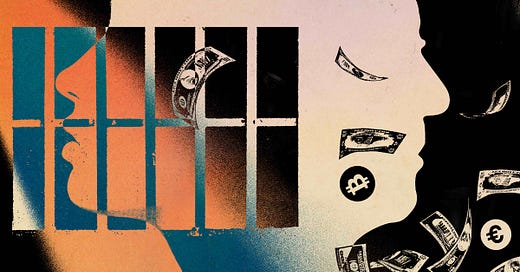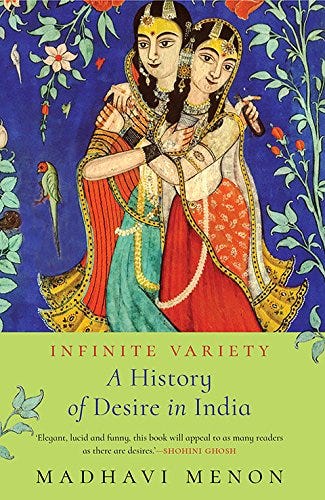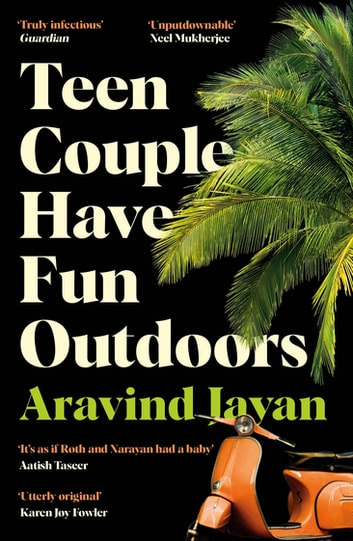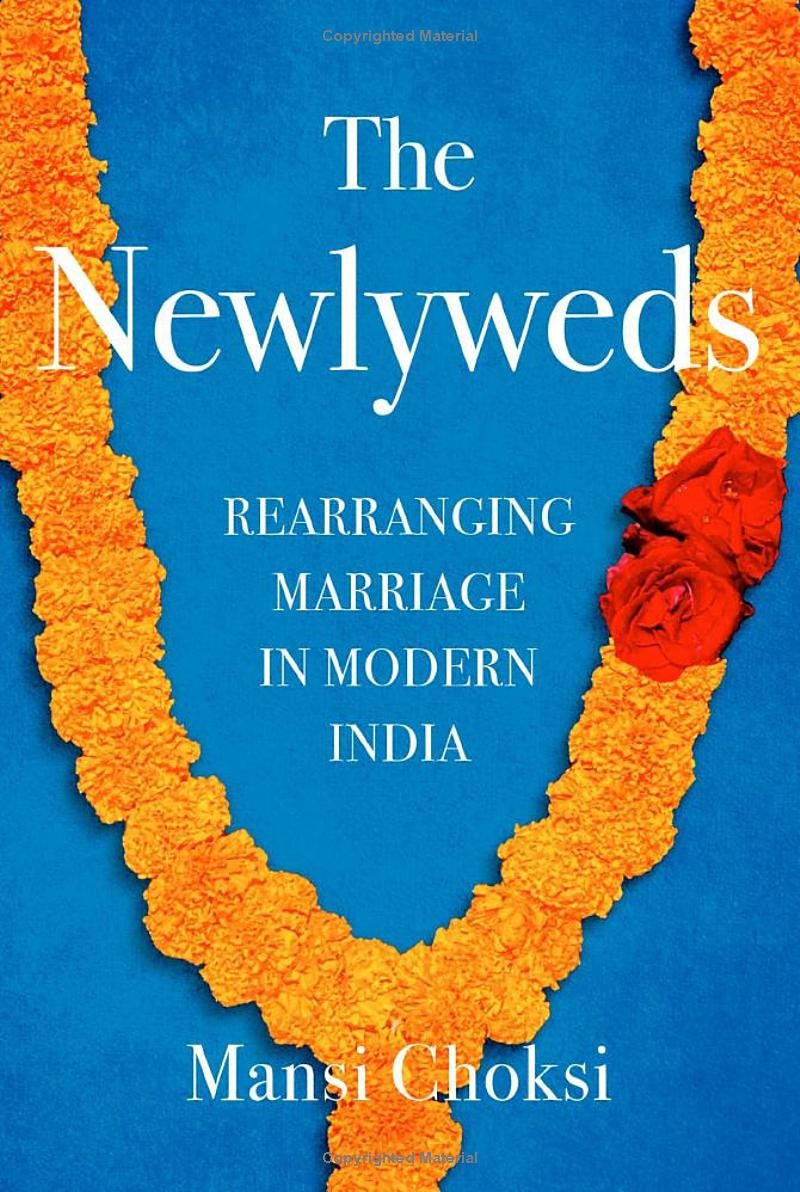Episode 4 of Love Commandos is out now. “Forever Yours” is a follow-the-money story that takes us from a New Delhi shelter to a Swedish underwear company to trace how the expectations of Western donors might have cast a shadow on life in the Love Commandos shelter. What are the stories that Western donors expect about romantic love in a country where arranged marriage is the norm? How might an Indian NGO - seeking to capitalize on those expectations - misuse couples under its care? The material in this episode drew me to doing this series in the first place, so take a listen and tell me what you think in the subscriber chat. Also: next week I’m going to be talking to Smriti Mundhra, director of The Romantics and the hit show Indian Matchmaking (and exec producer of Jewish Matchmaking). Love it? Hate it? Tell me the questions that you’d like me to ask Smriti in the chat.
In today’s post, I’m doing something a bit different. In respect of August as a time to get off the internet and read, here is a short library of recommended companion reading as you listen to Love Commandos. There’s a work of academic history, of investigative journalism, and a novel, so whatever your preference, I hope you’ll find something here to dig into on a hot summer weekend. And of course, if you like this sort of thing, please do share this widely, and if its been shared with you, consider subscribing.
The Historian
How has India, the birthplace of the Kama Sutra, where millions of people know the stories of cross-dressing gods, and sculptures of anal sex adorn the walls of ancient Hindu and Jain temples, become a place that casts shame on the expression of sexual desire and speaks of transgender identity as a “foreign conspiracy”? Colonialism is part of the answer: the British exploited Indian resources while justifying their presumed moral superiority by policing what the ‘natives’ practiced sexually. But Infinite Variety: A History of Desire In India, by Madhavi Menon, is not a simple “blame the British” screed. Manon, who has written several books on queer theory, is less interested in understanding how India shifted from an era of permissiveness to an era of repression, and more interested in discovering that the dividing lines are not so neat.
Consider, for example, public parks. In modern India, where space is at a premium and people tend to live with their parents until marriage, public parks provide safe cover for young lovers to make out. (Paradoxically, a country that makes it difficult for an unmarried couple to rent a hotel room turns the other way when the same act is loosely shaded by shrubbery.) Still, there are times when self-proclaimed defenders of morality enter the parks specifically to target couples. (Be especially careful on Valentines Day, as you’ll hear from today’s episode.) Even then, the attitude toward love is complicated. Consider “Operation Majnu,” the code name given to sting operations mounted by the Uttar Pradesh police in 2005 in a bid to counter the molestation of women but which mostly targeted necking couples. Majnu is “the name most desired by male lovers,” as Manon points out. It’s derived from the Arabic tale of Laila and Majnu, a Romeo and Juliet tale where both lovers die but whose love lives on as the model and inspiration for lovers in centuries to come. (The ‘graves’ of Laila and Majnu were for a long time visited by newlyweds seeking blessing.) So is Majnu the enemy of sanctioned love, or its guardian? Perhaps both. (In the Love Commandos shelter, Romeo was name of the guard dog.)
The Novelist
“Sex was one thing; a sex scandal was another thing altogether.”
Sex in a public park is the inciting incident in this novel by Aravind Jayan. When Sreenath and his girlfriend Anita are secretly filmed making out in a public park, the slow burn scandal (the views on the video tick upward as the family dynamic disintegrates) drives Sreenath’s parents to boot him from the house and effectively disown him. The act of banishment will have disastrous results for the whole family’s mental health. (Interestingly, in all the many discussions of the video that take place throughout the book, there is scant interest in and zero blame placed on the maker of the sex tape. It is as if this person is simply the impersonal and roving Eye of society itself.) The story is narrated by Sreenath’s unnamed younger brother, who in trying to make peace in the family makes himself the object of universal distrust.
One pleasure of reading this book, after listening to Love Commandos, is the uncertain distance between the world of this book and the media landscape of “honor killings”. The simplistic math of media narratives (where acts of sexual expression in India are met with violent punishment) is not the reality for these middle class urban families of Trivandrum, in the state of Kerala. In fact, the prospect that Anita’s parents might act violently toward Sreenath or his parents — revenge their shame with acts of aggression — is itself seen as shameful, and low-class. “What’s next,” Sreenath’s dad mocks Anita’s uncle for pressuring his son into marriage. “Soon you’ll be sending goons to beat us up.”
Sreenath mocks her parents the same way. “Maybe they’ll go full right-wing and beat up couples on Valentine’s Day.”
But Anita doesn’t laugh. “Who knows,” she says.
It’s that uncertain “Who knows” that makes this novel such a great companion read to Love Commandos. It’s not that violence is completely absent from this world. It’s more like the violence is somewhere in the background, and every character in the story is navigating their distance from it. This sort of nuance is one that - quite honestly - we struggled to express in Love Commandos. In fact, even now it’s hard to know if some of the couples who sought protection from the Love Commandos were correct to fear violence from their families, and even harder to figure out how to discuss their uncertainty without undermining the legitimacy of their concern.
The Journalist
A must read for anyone enjoying this series. My guest co-host Mansi Choksi spent years following love couples in India about their decision to defy their parents. Through diary entries and other first person accounts, The Newlyweds: Rearranging Marriage In Modern India reveals the strain of that defiance on a relationship over time. Can couples stay together despite societal disapproval and the lack of family support? Choksi discusses her personal experience growing up as the daughter of a love marriage that ended in tragedy. Recommending the book for NPR, correspondent Lauren Frayer writes: “Mansi Choksi braids the love stories of three couples who break boundaries of caste, religion and gender to be together. Choksi observes them like an anthropologist, documents their courtships like the investigative journalist she is – and writes like a poet. The result is a meditation on love, and what we sacrifice for it.” If you hear the Love Commandos podcast, the scenes with Sanjoy Sachdev take on even more resonance.
Poll of the Week
I’ve noticed how many of you in your comments (keep them coming by the way) reference books you’re reading, and it makes me so curious to do what George Saunders does so nicely on his Substack and share more book recommendations among this group. Would you be interested in joining something like that?









Definitely intrigued about Mansi Choksi’s Newlyweds but also wary of the tragedy. I’m a bit emotional these days (in German, we’d say “I’m built close to the water lately”)
Happily adding these to my reading list. I'd love more book recs and forget digital nomads, I'd love good reads about nomadic cultures, the act of sedentarisation against them and how/if their cultures can survive in a world so concerned with borders.